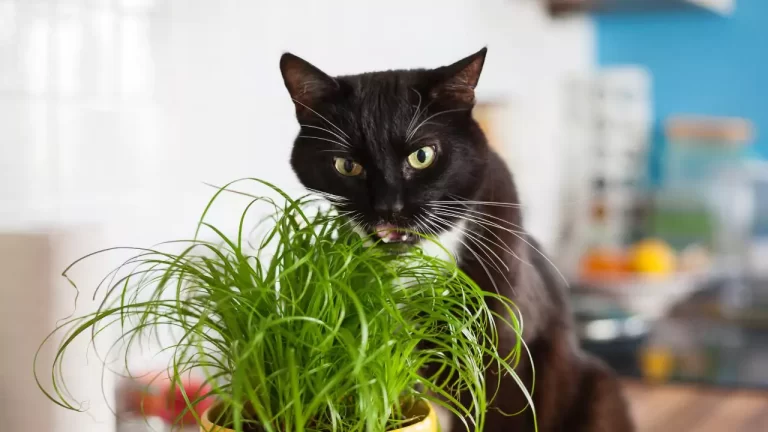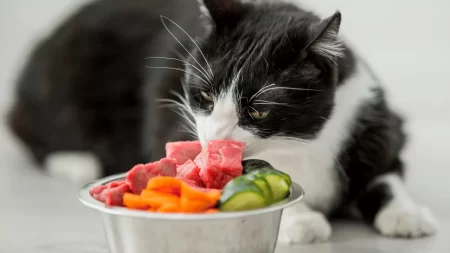Cats may eat grass for various reasons. One primary motive is to obtain folic acid, a nutrient found in grass that aids in oxygen transport through the bloodstream.
Additionally, grass provides roughage, promoting digestion and eliminating hairballs, leading to more regular gastrointestinal function in cats.
Some experts suggest that the chlorophyll in grass contributes to maintaining a cat’s fresh breath. Contrary to common belief, cats don’t only consume grass when unwell; it’s a common behavior even in healthy cats.
The act of eating grass is considered natural for cats, potentially serving as a natural laxative to aid digestion and prevent constipation when consumed in small amounts.
Reasons Why Cats Eat Grass
Natural Behavior
One of the most common explanations for why cats eat grass is that it is a natural behavior inherited from their wild ancestors. Cats are carnivores, but they also consume some plant matter when they hunt and eat their prey, such as rodents, birds, or insects. Grass is one of the most abundant and accessible plants for cats, and they may instinctively seek it out to supplement their diet.
Nutritional Benefits
Another possible reason why cats eat grass is that it provides some nutritional benefits for them. Grass contains various vitamins, minerals, antioxidants, and enzymes that may help cats with their digestion, immunity, and metabolism. Grass also contains chlorophyll, which is a natural anti-inflammatory and detoxifier that may help cats with their skin, blood, and oral health.
Digestive Aid
Some people believe that cats eat grass to help them vomit, either to get rid of hairballs, indigestible parts of their prey, or toxins. However, this is not necessarily true, as only a small percentage of cats vomit after eating grass, and most of them do not show signs of illness or discomfort. A more likely explanation is that cats eat grass to help them regulate their bowel movements, as grass can act as a laxative or a fiber source that can ease constipation or diarrhea.
Parasite Prevention
Another possible reason why cats eat grass is that it helps them prevent or eliminate parasites, such as worms, fleas, or ticks. Grass may have some anti-parasitic properties, or it may stimulate the cat’s immune system to fight off the invaders. Grass may also help cats expel parasites through vomiting or defecation, or simply by scratching them off their fur.
Enjoyment
Finally, some cats may eat grass simply because they enjoy it. The grass may provide some sensory stimulation, such as taste, smell, or texture, that cats find appealing or satisfying. Grass may also offer some mental stimulation, as cats may explore, play, or hide in it. Grass may also serve as a stress reliever, as cats may use it to cope with boredom, anxiety, or frustration.
Is It Safe for Cats to Eat Grass?
In general, eating grass is not harmful for cats, and may even have some benefits for them. However, there are some potential dangers that cat owners should be aware of, and some considerations for indoor cats.
Potential Dangers
Some of the potential dangers of eating grass for cats are:
- Grass may be contaminated with pesticides, herbicides, fertilizers, or other chemicals that can be toxic for cats. Cat owners should avoid using these substances on their lawns or gardens, or keep their cats away from treated areas.
- Grass may also harbor parasites, bacteria, fungi, or viruses that can infect cats and cause diseases. Cat owners should keep their cats up to date with their vaccinations and deworming, and monitor their health regularly.
- Grass may cause choking, gagging, or coughing in cats, especially if they swallow large or sharp pieces. Cat owners should supervise their cats when they eat grass, and check their mouth and throat for any obstructions or injuries.
- Grass may also cause allergic reactions in some cats, such as sneezing, itching, or swelling. Cat owners should observe their cats for any signs of allergies, and consult their veterinarian if they suspect a problem.
Considerations for Indoor Cats
Indoor cats may also have the urge to eat grass, but they may not have access to it. Cat owners should provide some alternatives for their indoor cats, such as:
- Growing some cat-friendly plants indoors, such as wheatgrass, oat grass, barley grass, catnip, or catmint. These plants are easy to grow and can be purchased from pet stores, garden centers, or online. Cat owners should make sure that the plants are organic and free of any chemicals, and place them in a safe and accessible spot for their cats.
- Offering some fresh or dried herbs, such as parsley, mint, basil, or dill. These herbs can also provide some nutritional and health benefits for cats and can be sprinkled on their food or water, or given as a treat. Cat owners should avoid giving their cats any herbs that are toxic for them, such as garlic, onion, chives, or rosemary.
- Provide some toys, treats, or puzzles that can simulate the experience of eating grass, such as grass-flavored catnip, grass-shaped chew toys, or grass-filled balls. These items can also keep indoor cats entertained, stimulated, and happy.
Encouraging or Discouraging Grass Eating
Depending on the situation, cat owners may want to encourage or discourage their cats from eating grass. Here are some tips on how to do so:
How to Encourage Cats to Eat Grass?
Some cat owners may want to encourage their cats to eat grass, as it may have some benefits for them. To do so, they can:
- Provide a variety of grasses and plants for their cats to choose from, and rotate them regularly to keep them fresh and interesting.
- Praise and reward their cats when they eat grass and avoid scolding or punishing them for doing so.
- Make grass eating a fun and positive experience for their cats, and join them in their activity.
Alternatives to Grass
Some cat owners may want to discourage their cats from eating grass, as it may have some risks for them. To do so, they can:
- Remove or limit the access to grass and plants for their cats, and keep them indoors or in a fenced area.
- Provide some alternatives to grass, such as the ones mentioned above, or some other healthy and safe foods or supplements for their cats.
- Distract and divert their cats from eating grass, and engage them in some other activities, such as playing, grooming, or cuddling.
How to Discourage Grass Eating?
Some cat owners may want to discourage their cats from eating grass, as it may have some risks for them. To do so, they can:
- Remove or limit the access to grass and plants for their cats, and keep them indoors or in a fenced area.
- Provide some alternatives to grass, such as the ones mentioned above, or some other healthy and safe foods or supplements for their cats.
- Distract and divert their cats from eating grass, and engage them in some other activities, such as playing, grooming, or cuddling.







